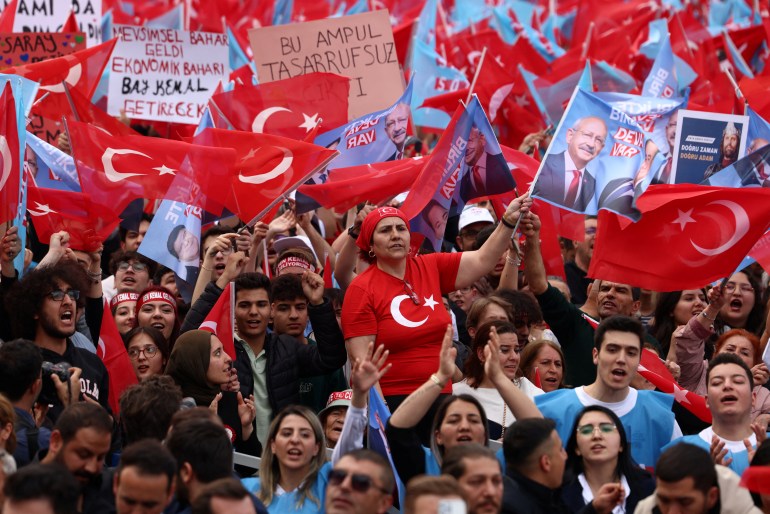For more than a decade, opposition leader Kemal Kilicdaroglu struggled in the shadow of his rival Recep Tayyip Erdogan, the country’s most electorally successful politician.
The mild-mannered, bespectacled former bureaucrat seemed the antithesis to Erdogan’s bombastic style and was therefore doomed – according to the perceived wisdom – to yet another loss at the polls.
Some opposition supporters even feared his presidential candidacy would snatch defeat from the jaws of victory as Erdogan has struggled with an economic crisis and the aftermath of February’s deadly earthquakes in southeastern Turkey.
However, since the March announcement that he would stand as the candidate for a six-party strong opposition alliance – later endorsed by parties outside the “Table of Six” coalition – Kilicdaroglu has edged ahead in the polls against a president renowned for his political acumen and durability.
The sprightly 74-year-old has centred his campaign on a promise to return Turkey to parliamentary democracy – ending the presidential system introduced by Erdogan that critics deride as “one-man rule”.
“Kemal Bey’s victory will mean the victory of democracy in Turkey again,” said Murat Emir, a lawmaker with Kilicdaroglu’s centre-left Cumhuriyet Halk Party (Republican People’s Party, CHP). “The authoritarian regime will have lost and the forces in favour of democracy will have won … [this] will create hope in all countries.”

From accountant to politician
Born in Tunceli province, eastern Turkey, Kilicdaroglu carved out a career as a government accountant, rising steadily for 20 years to become head of Turkey’s social insurance institute. He left the civil service in 1999 and soon joined the Demokratik Sol Party (Democratic Left) led by Prime Minister Bulent Ecevit.
Failing to make the party’s list for the 1999 election, he switched to the CHP and entered parliament three years later as a deputy for Istanbul, earning a reputation for exposing corruption.
Despite an unsuccessful bid for mayor of Istanbul in 2009, the following year, Kilicdaroglu received overwhelming support for his party leadership bid after the incumbent was engulfed in a sex tape scandal.
During his 13-year tenure at the head of Turkey’s oldest political party, established by the country’s founder Mustafa Kemal Ataturk, Kilicdaroglu has moved the CHP away from its Kemalist roots towards becoming a social democratic movement able to reach out to conservative voters that form Erdogan’s base.
This approach, however, largely failed to translate into votes until local elections in 2019. Allied with the right-wing Iyi Party (Good Party) and the ultra-conservative Saadet Party (Felicity Party), and backed by Turkey’s main pro-Kurdish party, the Halkların Demokratik Party (Peoples’ Democratic Party, HDP), the CHP won a number of major cities from the AK Party, including Istanbul and Ankara.
The first obvious sign of Kilicdaroglu shaking off his bureaucrat image had come two years earlier when, aged 68, he carried out a 450km (280-mile) “March for Justice” from Ankara to Istanbul. The march was in protest of the jailing of a CHP deputy and a wider government crackdown following a 2016 attempted coup.
The success of the 2019 elections has seen Kilicdaroglu expand the opposition alliance to six parties, including two led by former Erdogan ministers, and cement ties with the HDP, the country’s second-largest opposition party.
A homely image
During the campaign, Kilicdaroglu has played on his more homely image to reach out through social media, particularly to Turkey’s 4.9 million first-time voters. In Twitter videos usually filmed from his kitchen or study in Ankara, he has appeared in an open-necked white shirt, his sleeves rolled up, to put forward his policies.
It was in such a video last month that he addressed one of the major question marks over his candidacy, his Alevi faith.
Alevis are a religious minority that shares characteristics with Shia Islam, Sufism and Anatolian folk traditions. They make up an estimated 10 percent to 15 percent of Turkey’s population and have faced widespread persecution.
Some thought his minority heritage could be a hindrance for Kilicdaroglu in winning voters. But by tackling his Alevi background head-on, and pledging to represent all citizens regardless of religion or ethnicity, he appears to have largely nullified the subject.
While promising further democratisation, the opposition has also said it will return to more conventional economic policies in a manifesto under the banner, “I promise you, spring will come again.”
Kilicdaroglu has also said his government would send the 3.6 million Syrians currently living in Turkey back to their home country within two years – a policy that appeals to the majority of Turks but which alarms many Syrians who have lived in Turkey for years.
“If they send us back, where will we go?” asked Kadeem, a Syrian living in Istanbul who only wanted to give his first name. “Will they send us back to be killed by Assad? Will we have somewhere to live, to send our kids to school or jobs?”


